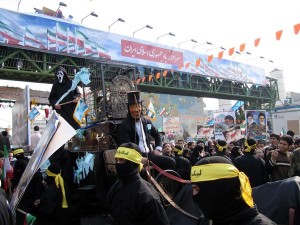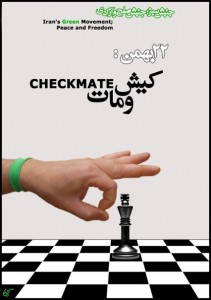Wednesday
Feb242010
Afghanistan Latest: Anger at US over Civilian Deaths; Karzai's Power Move; Drug Users Training Afghan Police?
 Wednesday, February 24, 2010 at 9:55
Wednesday, February 24, 2010 at 9:55  Juan Cole offers a full round-up of developments:
Juan Cole offers a full round-up of developments:Pajhwok News Agency reports that on Tuesday, the Afghanistan senate deplored the foreign airstrikes that killed 21 innocent civilians in the province of Daikundi on Sunday, and demanded that NATO avoid any repetition of this sort of error.
But some senators went farther, demanding that NATO or US military men responsible for the deaths be executed. Senator Hamidullah Tokhi of Uruzgan complained to Pajhwok that the foreign forces had killed civilians in such incidents time and again, and kept apologizing but then repeating the fatal mistake: "Anyone killing an ordinary Afghan should be executed in public."
Afghanistan Analysis: Dutch Government Falls Over Troop Withdrawal
Lawmaker Fatima Aziz of Qunduz concurred, observing, "We saw foreign troops time and again that they killed innocent people, something unbearable for the already war-weary Afghans."
Maulvi Abdul Wali Raji, a senator from Baghlan Province, called for the Muslim law of an "eye for an eye" to be applied to foreign troops for civilian deaths. Pajhwok concludes, "Mohammad Alam Izdiyar said civilian deaths were the major reason behind the widening gap between the people and Afghan government."
Note that those speaking this way are not Taliban, but rather elected members of the Afghanistan National Parliament, whose government is supposedly a close US ally.
Sarah Chayes, a former National Public Radio correspondent who lived for years in Qandahar but has been on Gen. Stanley McChrystal's staff for the past year, told CNN that she sees increasing frustration in the Afghan public over the killing of civilians by NATO and US strikes. She implies that how the government of President Hamid Karzai deals with this issue could determine its fate, given that it is acting like, and perceived as acting like a criminal syndicate.
In the meantime, Karzai is taking no chances. Radio Azadi reports in Dari Persian that Karzai took control of the supposedly independent Electoral Complaints Commission, and will appoint all 5 of its members. The system had been that 3 members were appointed by the United Nations, and the other two chosen by the supreme courty chief justice and the independent high electoral commission.
The ECC threw out about 1 million fraudulent ballots in last summer's presidential election, a move that could have forced Karzai into a run-off election against rival Abdullah Abdullah. But the latter withdrew from the race on the grounds that Karzai controlled the in-country electoral commission and refused to relinquish control of it. Many observers believe that Karzai stole the election. In short, Karzai is increasingly acting like a Middle Eastern dictator, manipulating state institutions to ensure that he cannot be unseated in an election.
Whatever US troops are fighting for in Afghanistan, it is not democracy.
As for those nearly 100,000 trained Afghan troops that Washington keeps boasting about, it turns out that the Pentagon sub-sub-contracted the troop training and "a Blackwater subsidiary hired violent drug users to help train the Afghan army." Many journalists doubt that there are actually so many troops in the Afghanistan National Army, citing high turnover and desertion rates, while others suggest that two weeks of 'show and tell' training for illiterate recruits is not exactly a rigorous 'training'-- even if it were done properly, which it seems not always to have been.
Canadian Brig. Gen. Daniel Ménard said that some estimates of the number of Taliban roadside bombs planted in Marjah were too low, putting them at 400 to 500. He said that despite what happened in Marjah, where Taliban took advantage of the ample warning NATO gave that it was coming, the same procedure will be followed this May when the Kandahar campaign begins. It is aimed at blunting the summer campaign of Taliban coming over the border from Pakistan.
Former Pakistan chief of staff, Mirza Aslam Beg, wrote in Nava-e Waqt for February 23, 2010, explaining Taliban strategy in Marjah. These passages were translated from Urdu by the USG Open Source Center:
Marjah is located some 15 km from Lashkargah City, which is the provincial capital of Helmand Province. It is a flat desert area. It has a few scattered mud houses. There is a green belt to its north and west, which is irrigated by the Helmand River. This green belt has large agricultural farms and orchards, with a population of about 6,000 to 7,000 people. The entire terrain is flat and totally unsuitable for guerilla war, which is the preferred style of the Taliban. It will be very easy for the allied air forces and ground war machine to control the movement of the Taliban in this area. Now, the question arises is why are the allied forces preparing for a similar kind of heavy attack in an area where there is hardly any resistance?
It appears there is a historical and psychological factor behind this decision. History says that every army that went to this area did not return safely. The allied forces believe that if they succeed in taking control of Marjah and the Taliban are compelled to back off, the allied forces will gain a psychological upper hand, making it easy for them to carry out operation against the Taliban in other provinces in Afghanistan as well.
The Taliban have become experts in fighting a war in the difficult desert terrain of the northern regions for the past 30 years. They are brave mujahids [holy warriors] who have full confidence in themselves and in their quest for success against their enemies. Time and circumstance are totally on their side. Thus, it is easy to understand their strategy in the battle of Marjah.
One of their strategies is to send 1,000 to 2,000 fighters under the command of Commander Mullah Abdul Razzaq. These fighters are committed to fight until their last breath and will bleed the allied forces to the end. They will defend the region with their scattered fighters spread all over the area. They will also defend the area against the attacking forces through the use of improvised engineering devices (IEDs), including the Omar bomb and booby traps. Their ground defense system, which was used by the Hezbollah against Israel in 2006, can also be used as a defense weapon. This strategy has been used by the Taliban during the last four days of this war.
The number of Taliban present in the adjacent areas of Helmand is around 10,000 to 12,000. These troops have the ability to attack the allied forces from the nearby areas of the main battleground and keep them engaged by attacking them regularly. Moreover, they will cut off the supply line of the allied forces. Under this strategy, on one side, the Taliban will continue the battle in Marjah, and on the other side, they will create problems for the allied forces by increasing attacks on them in provinces under their control.
tagged  Abdullah Abdullah,
Abdullah Abdullah,  Afghanistan Electoral Complaints Commission,
Afghanistan Electoral Complaints Commission,  Blackwater,
Blackwater,  Daniel Menard,
Daniel Menard,  Fatima Aziz,
Fatima Aziz,  Hamid Karzai,
Hamid Karzai,  Hamidullah Tokhi,
Hamidullah Tokhi,  Hezbollah,
Hezbollah,  Juan Cole,
Juan Cole,  Maulvi Abdul Wali Raji,
Maulvi Abdul Wali Raji,  Mirza Aslam Beg,
Mirza Aslam Beg,  Mohammad Alam Izdiyar,
Mohammad Alam Izdiyar,  NATO,
NATO,  Nava-e Waqt,
Nava-e Waqt,  Pajhwok Afghan News,
Pajhwok Afghan News,  Radio Azadi,
Radio Azadi,  Sarah Chayes,
Sarah Chayes,  Stanley McChrystal,
Stanley McChrystal,  Taliban in
Taliban in  Afghanistan
Afghanistan
 Abdullah Abdullah,
Abdullah Abdullah,  Afghanistan Electoral Complaints Commission,
Afghanistan Electoral Complaints Commission,  Blackwater,
Blackwater,  Daniel Menard,
Daniel Menard,  Fatima Aziz,
Fatima Aziz,  Hamid Karzai,
Hamid Karzai,  Hamidullah Tokhi,
Hamidullah Tokhi,  Hezbollah,
Hezbollah,  Juan Cole,
Juan Cole,  Maulvi Abdul Wali Raji,
Maulvi Abdul Wali Raji,  Mirza Aslam Beg,
Mirza Aslam Beg,  Mohammad Alam Izdiyar,
Mohammad Alam Izdiyar,  NATO,
NATO,  Nava-e Waqt,
Nava-e Waqt,  Pajhwok Afghan News,
Pajhwok Afghan News,  Radio Azadi,
Radio Azadi,  Sarah Chayes,
Sarah Chayes,  Stanley McChrystal,
Stanley McChrystal,  Taliban in
Taliban in  Afghanistan
Afghanistan 






